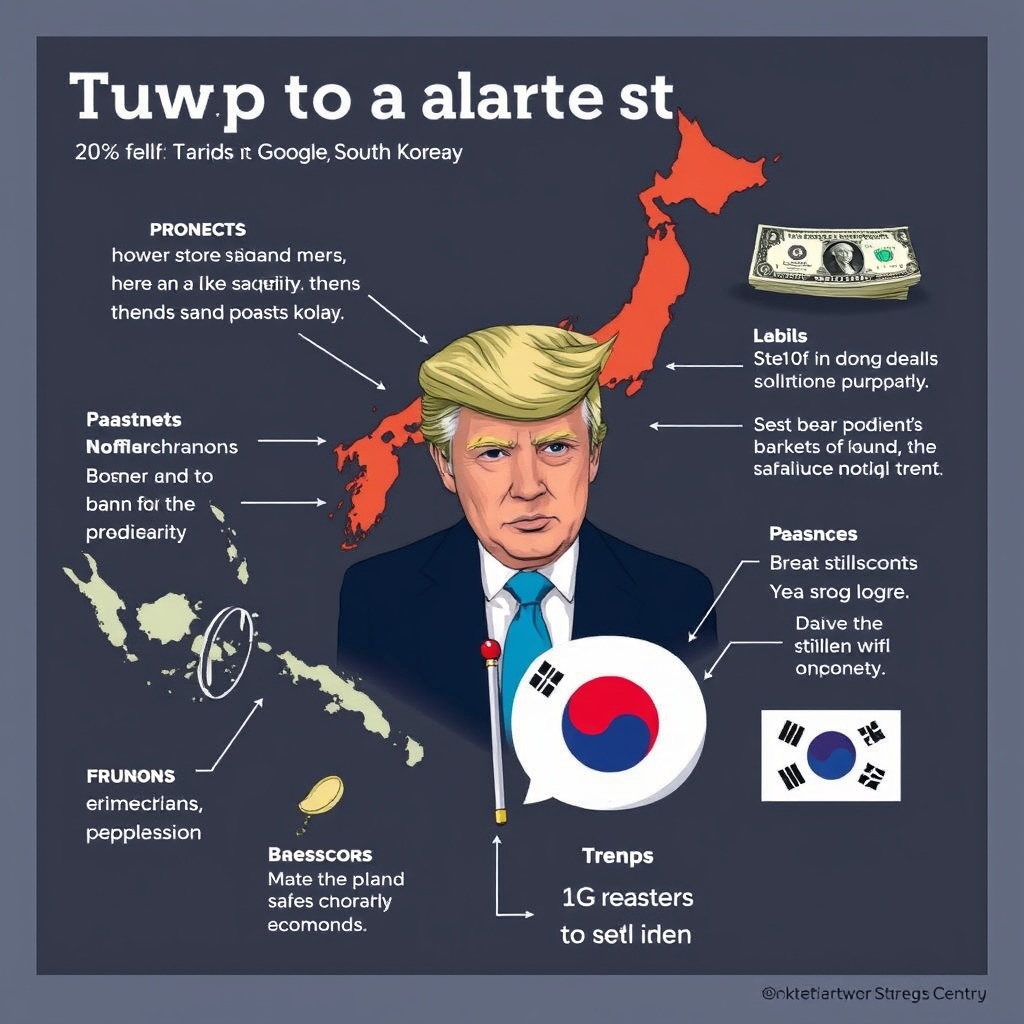Introduction
The global market has been experiencing a significant shift in recent days, with major stock indexes declining and the dollar strengthening against major currencies. This sudden change can be attributed to the announcement made by President Donald Trump, unveiling a plan to impose 25% tariffs on goods from Japan and South Korea. The move has sent shockwaves across the financial world, with investors and economists alike trying to make sense of the potential implications. In this article, we will delve into the details of the tariffs, their potential impact on the global economy, and the reactions of major stakeholders.
Impact on Stock Market
The announcement of the 25% tariffs on Japanese and South Korean goods has had an immediate impact on the stock market. Major stock indexes, such as the Dow Jones and the S&P 500, declined significantly on Monday, with investors scrambling to assess the potential damage. The tariffs are expected to affect a wide range of industries, from electronics to automobiles, and the uncertainty surrounding the move has led to a decrease in investor confidence. According to a report by Reuters, the Dow Jones Industrial Average fell by over 200 points, while the S&P 500 declined by 1.2%. The tech-heavy Nasdaq Composite Index also suffered a significant loss, dropping by 1.5%.
The decline in stock prices can be attributed to the expected increase in costs for companies that rely on imports from Japan and South Korea. With the tariffs in place, these companies will have to pay more for the same goods, which could lead to higher prices for consumers and reduced profit margins. For example, Apple, which relies heavily on imports from Asia, saw its stock price decline by over 2% on Monday. Similarly, other companies that have significant exposure to the Asian market, such as Intel and Cisco Systems, also experienced a decline in their stock prices.
Dollar Strengthens Against Major Currencies
The announcement of the tariffs has also had a significant impact on the foreign exchange market, with the dollar strengthening against major currencies. The US dollar index, which measures the value of the dollar against a basket of six major currencies, rose by over 0.5% on Monday. The strengthening of the dollar can be attributed to the expected increase in demand for the US currency, as companies and investors seek to mitigate the impact of the tariffs.
The appreciation of the dollar has significant implications for the global economy, particularly for countries that rely heavily on exports to the US. A stronger dollar makes their exports more expensive, which could lead to a decline in demand and a subsequent decline in economic growth. For example, the Japanese yen declined by over 1% against the dollar on Monday, making it more expensive for Japanese companies to export goods to the US. Similarly, the South Korean won also declined by over 1% against the dollar, which could have a significant impact on the country's export-driven economy.
Potential Impact on Global Trade
The imposition of 25% tariffs on Japanese and South Korean goods has significant implications for global trade. The move is expected to disrupt the global supply chain, leading to higher costs and reduced efficiency. According to a report by the World Trade Organization, the tariffs could lead to a decline in global trade by over 1%, which could have a significant impact on economic growth.
The tariffs also have the potential to spark a trade war, with other countries retaliating against the US with their own tariffs. For example, China, which has been engaged in a trade war with the US for over a year, could impose additional tariffs on US goods in response to the move. This could lead to a significant escalation of the trade war, with far-reaching implications for the global economy.
Reactions from Japan and South Korea
The governments of Japan and South Korea have reacted strongly to the announcement of the tariffs, with both countries expressing their disappointment and concern. According to a statement by the Japanese Ministry of Economy, Trade and Industry, the tariffs are "unacceptable" and could have a significant impact on the country's economy. Similarly, the South Korean government has expressed its "deep concern" over the move, stating that it could lead to a decline in trade and economic growth.
Both countries have also hinted at the possibility of retaliatory measures, with Japan's Chief Cabinet Secretary, Yoshihide Suga, stating that the country would "take necessary measures" to protect its interests. Similarly, South Korea's Trade Minister, Yoo Myung-hee, has stated that the country would "not hesitate" to take retaliatory measures if the tariffs are imposed.
Conclusion
The announcement of 25% tariffs on Japanese and South Korean goods has sent shockwaves across the financial world, with significant implications for the global economy. The decline in stock prices, the strengthening of the dollar, and the potential disruption to global trade are all causes for concern. As the situation continues to unfold, it is essential for investors, economists, and policymakers to closely monitor the developments and assess the potential impact on the global economy.
In the coming days and weeks, we can expect to see a significant amount of volatility in the financial markets, as investors and traders try to make sense of the tariffs and their potential implications. The reactions of major stakeholders, including the governments of Japan and South Korea, will also be closely watched, as they could have a significant impact on the direction of the global economy.
Ultimately, the imposition of tariffs on Japanese and South Korean goods is a complex issue, with far-reaching implications for the global economy. As we move forward, it is essential to consider the potential consequences of the move and to work towards finding solutions that promote free trade and economic growth. By doing so, we can mitigate the negative impacts of the tariffs and promote a more stable and prosperous global economy.


Leave a comment